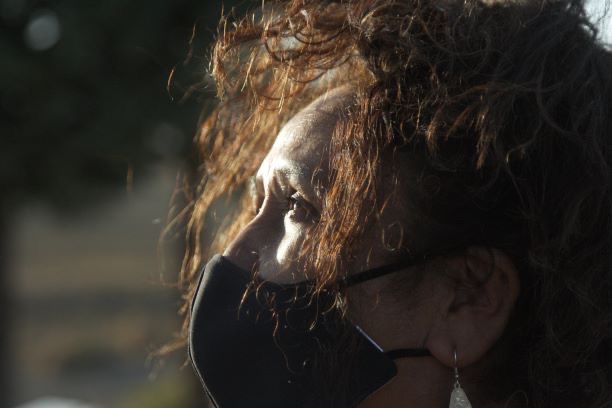
Myron Smart, a community member of the Fort McDermitt Reservation, gives the author a tour of his community's land which could be negatively impacted by the planned lithium mine at Thacker Pass.
An ancient landscape and known massacre site sacred to Indigenous communities throughout the West face possible desecration at the proposed Thacker Pass lithium mine, 35 miles south of the Oregon-Nevada border in Humboldt County.
Environmental and tribal activists have been camped out at Thacker Pass — or Peehee mu’huh in Paiute — for nearly 10 months to halt construction by Lithium Nevada, a subsidiary of the international mining corporation Lithium Americas. The Thacker Pass Lithium Mine project, which would develop the nation’s largest known reserve of lithium in the name of the “clean energy transition,” has encountered mounting obstacles for its potential harms to the environment and local communities.
On Sept. 30 of last year, the Bureau of Land Management (BLM) issued an archeological permit which would allow a contractor hired by Lithium Nevada to excavate Thacker Pass following an approved plan known as the Historic Properties Treatment Plan (HPTP). But tribal leaders said they were not properly consulted and condemned any potential disturbance brought to their ancestors’ graves.
“Our trust has not been held responsibly,” said Arlan D. Melendez, who has served as chairman of the Reno-Sparks Indian Colony for 26 years. “We’ve given up enough. This treatment of the land goes against our culture and way of life. It never seems to end. We are always in this protective fight.”
Dig at Thacker Pass threaten sacred site: 'This isn’t how ethical archaeology is done'
When mining companies form agreements with the BLM in areas known to have artifacts and historical significance, they are obligated to follow guidelines created in the HPTP under the National Historic Preservation Act. But the cultural significance of Thacker Pass to surrounding tribes has been undermined and not properly addressed by the BLM and Lithium Nevada, according to many tribal members.
“We have all these federal laws to guide the project, not to give us tribes a way to fully protect our culture,” said Michon R. Eben, Reno-Sparks Indian Colony tribe member and cultural resource manager.
To date, the representatives for the tribes maintain they have not been properly treated throughout the permitting processes. BLM has not acknowledged Thacker Pass as a massacre site in any communications with Eben, he said.
Given the violence of the settler-colonial era when the U.S. Cavalry forcibly and brutally removed Indigenous peoples from their land, treating the sites of that bloody history with reverence is of great importance to tribal leaders, and at the heart of what is at stake. The conflict at Thacker Pass could be the first of many land disputes as the new wave of mining for “critical” minerals like lithium stands to potentially jeopardize the land and cultures of more Indigenous communities — following more of the same ecological and cultural damages brought by fossil fuel extraction.
The archeological dig is the first step to clearing the way for an open-pit lithium mine spanning almost 18,000 acres across old-growth sagebrush habitat. It’s viewed by opponents as the beginning of the assault on the land.
"Without meaningful, ongoing consultation with all tribes that attach religious and cultural significance to Peehee mu’huh, which the BLM has not engaged in, such invasive archaeological work can amount to the further desecration of Indigenous sacred sites,” said Lucy Gill of the Archaeological Research Facility at UC Berkeley, who has experience in partnerships with Indigenous communities. “This isn’t how ethical archaeology is done.”

Indigenous communities say they aren't being consulted
The tribes have consistently protested the lack of comprehensive consultation with the Indigenous communities throughout the development of the Thacker Pass Lithium Mine project. The Bureau of Land Management has been accused of “fast-tracking” the permits and issuing an inaccurate and incomplete Record of Decision, allegations that are the subject of two lawsuits brought by rancher Ed Bartell and four environmental nonprofits.
On Sept. 3, federal Judge Miranda Du denied a preliminary injunction brought by the Reno-Sparks Indian Colony, Burns Paiute Tribe, and Atsa Koodakuh wyh Nuwu/People of Red Mountain (members of the Fort McDermitt Paiute-Shoshone reservation) which are located nearest to the mine and could suffer health impacts from potential air and water pollution. The lawsuit sought an emergency halt to any archeological digging.
The legal arguments alleged that the BLM violated the National Historic Preservation Act in permitting the mine. The lead attorney for that case, Will Falk, said the BLM did not attempt in “good faith” to consult those who attach cultural significance to Thacker Pass and “handpicked” a few tribes suffering as a result of the pandemic knowing they’d struggle to respond. The main arguments by Falk espouse the irreparable distress that tribal members would suffer if Thacker Pass was desecrated.
“This breaks my heart,” community leader Myron Smart, a member of the Fort McDermitt Paiute-Shoshone reservation, said. “My belief is that you don’t go digging through cemeteries. How would they like it if someone went to Arlington National Cemetery and started removing all the grass, putting bones in plastic bags to be kept in lockers? They are violating our ancestors lying there. Why aren’t they afforded the same respect?”
Eben said this is the least the BLM has done to consult with Indigenous authorities in the more than 16 years she's held per position as a tribal leader. Typically, she said, tribal members are included in-person at the cultural sites to counsel on the whereabouts of artifacts and burial grounds and to help ease the overall disturbance. “We did not hear about this mine until it was too late," she said, "and no tribal members have been asked to advise at the time of the survey, authoring of cultural inventory reports, HPTP, and MOA (Memorandum of Agreement). All of which are related to Paiute and Shoshone culture. This is not appropriate.”
Legal representation for the BLM asserted during the hearing on Sept. 3 that they mailed letters to tribal offices according to protocol. Representation for Lithium Nevada agreed and stated that “substantial consultation” with local tribes occurred.
“What they are calling adequate consultation is the fact that the BLM sent three letters to three different tribes.” Sitting at her desk in the Cultural Resources office in Reno, Eben motions to a heaping stack of papers. “These letters can easily be overlooked, especially during COVID,” she said. “And not all tribes have the resources to field this kind of communication; it’s not sufficient. And they chose to inform us at the end of the permitting process. That’s not appropriate. That’s a way designed to simply check a box.”
“Lithium Nevada is working hard to ensure impacts to historic artifacts are mitigated,” Tim Crowley, vice president of government affairs and community relations for Lithium Nevada, said in June.
Judge Du acknowledged the sacredness of Thacker Pass to the tribes but said the National Historic Properties Act "does not give the tribes the right to prevent all digging in the entire project area. It merely provides for consultation."
“It’s all about 'mitigation,'” Eben said. “For Native Americans, this is a government-sanctioned way to loot our artifacts. The treatment plan is based on discriminatory language and is in direct disrespect to our history.”
In part two of this story, we take a closer look at the downplayed history of the massacre at Thacker Pass and what’s next in the fight to protect the sacred site.
Interested in having your voice heard on 3p? Contact us at editorial@3BLMedia.com and pitch your idea for a guest article to us.
Images courtesy of the author

Cayte Bosler is an environmental journalist, a conservationist, and a graduate student at Columbia University where she trains to tackle complex and pressing environmental challenges.














